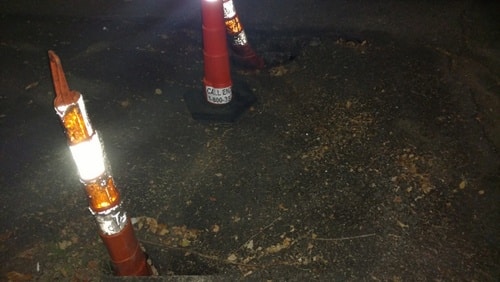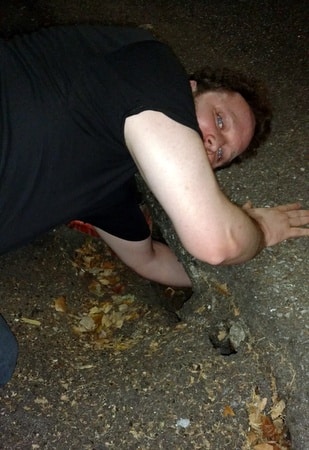
Owen Courrèges
So this cement truck, a Landrieu Cement Truck, was filling in this gigantic pothole on Mexico Street. It’s this company owned by the mayor’s cousin that contracts with the city. Anyway, while it was filling in this massive hole in the pavement, another sinkhole opened up and the cement truck fell in.
I know what you’re thinking: What’s the punchline?
Well, although this sounds like the setup for a joke, it’s actually not. It happened this past week, much to the chagrin of the residents of Pontchartrain Park.
“Out of an abundance of caution, the City’s Department of Public Works has secured the area around the roadway collapse at 5017 Mexico St. in Pontchartrain Park,” the city announced in a subsequent press release (as though just leaving a gaping sinkhole unsecured was actually on the table).
“At this time, we are developing a strategy repair the roadway,” the release continued.
I, for one, am not holding my breath. For the record, neither are nearby residents. Sheila Hyde-Brown, whose home lays nearby the new sinkhole, reported to WWL-TV that she’s complained about collapsing streets before and nothing has been done.
“You call 311, and when you explain the problem to them they say, ‘Oh no, I’m sorry, it’s another department: ‘Let me connect you over to Boh Brothers, or to Sewerage and Water Board,’” Hyde-Brown explained.
“Then we call Sewerage and Water Board, ‘Oh no, that’s Public Works.’ It’s just a run around. You cannot get a straight answer. That goes on for weeks.”
Gretchen Bradford, President of the Pontchartrain Park Neighborhood Association, is concerned that the problem will yield far more dire consequences. Exasperated, she told WWL-TV that “[w]e’re thinking one of the houses may cave in.” Under the circumstances, it’s difficult to accuse her of playing Chicken Little.
The debacle in Pontchartrain Park reminded me of a problem that developed earlier this year near the middle of my block. A section of pavement directly in front of a driveway had begun to collapse. I was considering calling the city about it, but one of my neighbors apparently beat me to it. Shortly thereafter, a mess of asphalt appeared over the site.
I was not optimistic. Even from my layman’s perspective, it was clear to me that a small sinkhole had formed, and sinkholes don’t go away when you hurl a bunch of bitumen and gravel on top of them. You have to repair the drainage problem that’s causing the subsurface to erode.
Predictably, the repair lasted about a week before the sinkhole resurfaced. Several months later, it still remains, surrounded by three traffic cones.
Here’s a photograph of what the sinkhole looks like today:

The sinkhole in question. (via Owen Courreges)
And here’s another photo of me sticking my arm as far as I can inside the sinkhole, where cars drive over at all times of day.

The author’s arm, inside the sinkhole. (via Owen Courreges)
When infrastructure becomes this compromised, catastrophic outcomes are no longer academic; they are imminent. A street cannot long support itself on its own when the ground washes away. If we continue to slap down a few pounds of asphalt on every hole in the pavement while disregarding underlying problems, it won’t just be a matter of towing out a cement truck – you’ll need to fish out a corpse.
Meanwhile, the city isn’t using scarce resources to repave streets on the verge of failure. No, it seems to be focusing on revamping streets in the French Quarter and CBD that are hardly marginal.
To its credit, the city does have some vague plans to begin working through the backlog of dilapidated side streets, probably through bond issues, and bring them up to some reasonable level. However, it’s not enough to propose a grand sweep. We need a dedicated annual road budget to make necessary repairs on an ongoing basis before they result in massive sinkholes.
Alas, the gumption necessary to rectify the situation is curiously absent from both the mayor’s office and the City Council. Sadly, that seems to be the real punch line.
Owen Courrèges, a New Orleans attorney and resident of the Garden District, offers his opinions for UptownMessenger.com on Mondays. He has previously written for the Reason Public Policy Foundation.
Uptown Homeowner: “Uhhh, City, can you send someone to fix the sinkhole in front of my house I’m renovating that is eating cars?”
City: “No, but we’ll be happy to tell you want type of siding you’ll be permittted to repair your house. Let me connect you to HDLC.”
Totally agree!! That last paragraph is EVERYTHING!!!
Let’s pay 33% extra to a “disadvantaged” business for inferior quality of work. If that doesn’t solve it, we can always try nepotism.